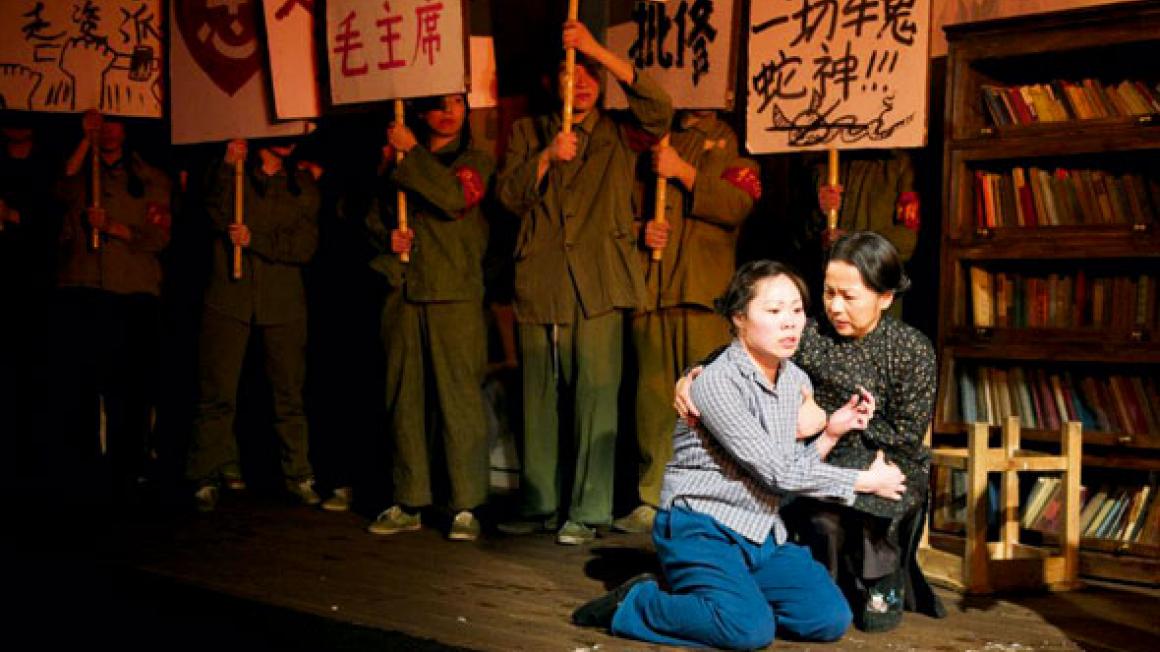Theatre Review: 11 May
ON STAGE
The perils of only wearing red
Hailed as a literary masterpiece, Wild Swans is potent theatre
Wild Swans
 The shelf-like stage of the Young Vic is teeming with market traders selling birds and vegetables, even soup. You can smell it. In the next scene in this stunningly staged adaptation of Wild Swans, Jung Chang's bestselling memoir of three generations of her family's experience of 20th-century China, the action moves to a field. Workers, some with babies strapped to their backs, till the thick, dark earth. Using handmade tools, they work the soil, then painstakingly rake it all up until not a speck is left and the fl oor is clean enough to become a hospital ward. It is an almost palpable rendering of the appalling subjugation of the Chinese in the 1950s.
The shelf-like stage of the Young Vic is teeming with market traders selling birds and vegetables, even soup. You can smell it. In the next scene in this stunningly staged adaptation of Wild Swans, Jung Chang's bestselling memoir of three generations of her family's experience of 20th-century China, the action moves to a field. Workers, some with babies strapped to their backs, till the thick, dark earth. Using handmade tools, they work the soil, then painstakingly rake it all up until not a speck is left and the fl oor is clean enough to become a hospital ward. It is an almost palpable rendering of the appalling subjugation of the Chinese in the 1950s.
In the hospital, a mother (Jung Chang's grandmother), brings food for her sick daughter, De-Hong, who is exhausted from labouring. Shockingly, her boyfriend, Shou-Yu, a stickler for Communist Party rules, insists that such preferential treatment is improper and that the meal must be shared by all the patients in the ward. Such is De-Hong's commitment to the cause, she accepts his position. Later, even after spending years in a labour camp for speaking out against the Party over the Great Famine, he still can't bring himself to put his family before his Party principles and refuses pull strings to help his daughter (Jung Chang) take up her scholarship to come to England. But, when he dies, De-Hong successfully exploits the system to enable her daughter to leave China, even though she must stay behind.
Had Jung Chang not left, she would never have had the freedom to write her story. Wild Swans remains banned in China.
Perhaps inevitably, shrinking nearly 700 pages to 90 minutes on the stage has resulted in an almost comic-strip crudeness to the characterisation and dialogue. However, Miriam Beuther's designs more than make up for it. As one daringly protracted scenechange creates a brand-new setting, you get a powerful sense of the turbulent physical and political transformations that took place in recent Chinese history. And of their crushing effect on individuals.
In the most haunting image, Shou-Yu and De-Hong are arrested and forced to stand on chairs with a notice of their crimes hung around their necks, then vanish behind an army of fanatical Red Guards waving flags and placards of Mao in a rigidly choreographed semaphore. Potent, indeed.
Until 13 May at the Young Vic: 020-7922 2922, www.youngvic.org


